|
Of old the Clan Chattan
were reckoned under two classes, the first, nine in number, sprung of
the Chiefs own house, and the second, those who had incorporated or
attached themselves though of other names than that of Mackintosh, being
sixteen in number. Amongst the latter class the Macgillivrays stood the
first and oldest, for according to the Croy M.S. history, compiled by
the Rev. Andrew Macphail, who, it is understood, died minister of
Boleskine, 1608, it is said that about the year 1268 “Gillivray, the
progenitor of the Clan vie Gillivray, took protection and dependence for
himself and posterity of this Farquhard Mackintosh” (5th of Mackintosh,
who was killed in 1274, aged 36).
Sir Eneas Mackintosh in
his manuscript, privately printed in 1892 by the present 28th of
Mackintosh, gives the date as 1271.
The origin of the name
may be looked for in the fourth or last part of Macgillivray, for
invariably in Gaelic, and in my younger days, elderly people of good
position put the weight on this last portion, and not, as is now
invariably done in English, on the second.
Betwixt this first and
Duncan (whom I placed as 1st of Dunmaglass), who lived about 1500, is a
long step, and it is not the purpose of these papers to do other, as a
rule, than deal with facts.
It may be taken for
granted that the Macgillivrays came from the West, and have been settled
at Dunmaglass, in the braes of Strathnaim, and along the valley of
Nairn, long before we know their authentic history. The descent of the
Dunmaglass family was reckoned very good in the Highlands, and the late
John Lachlan the 10th, who was exceedingly proud, and in his later days
a very reserved man, used in his cups to declare “he was descended of
kings.”
Dunmaglass, at least one
half of it, belonged to the old Thanes of Kalder, and is first mentioned
in the service of Donald as heir to his father, Andrew, in the lands in
the year 1414. The other half belonged to a family named Menzies in
Aberdeenshire, was bargained to be disposed of in 1419 to the above
Donald Kalder, who in 1421 gets a disposition of them, described as
lying within the baronyrof Kerdale. This was one of the extensive
baronies belonging to the old estate and earldom of Moray, but the
estate having been broken up, the barony has been long in desuetude. The
estate of Dunmaglass proper, now in one, was of considerable value,
being rated as a four pound land of old extent, equivalent to two
freeholds, and is generally found described in connection with the lands
of Invermarkie in Badenoch.
It is worth while for a
moment referring to the lands of Invermarkie. Like the adjoining lands
to the south of Kinrara and Dalnavert, these lands belonged in
superiority to the old Earls of Ross, afterwards to the Lords of the
Isles, Earls of Ross.
Invermarkie came to the
Kalders through the marriage oi William, apparent of Kalder, with
Mariotta-de-Sutherland about 1458. The peculiarity about Invermarkie is
this, that to this day it has never dropped out of the Cawdor titles,
though it has supposed to be possessed by the family for over 300 years.
In 1619 the then Campbell
of Calder was either anxious to-reclaim it, or desired to know how
matters stood with the Marquis of Huntly, Lord of Badenoch, and
requested his agent in Edinburgh, Mr John Mowatt, to look into the
matter, who on 4th April says to Calder in reply—“I have spoken my Lord
Enzie. who assures me that his predecessors has the lands of Innermarkie
by your predecessors resignation, and promised to let me see the rights
thereof.”
Again, when Angus
Macpherson of the “Sliochd Gillies” got his first charter of any lands
from George, Marquis Huntly, with consent of Lady Anna Campbell, his
spouse, and George, Lord Gordon, his son, by disposition and feu
contract, dated 22nd October, 1627, there was included “the lands of
Innermarkie (a davoch of land) with the mill thereof comprehending the
lauds of Achnisuchan, alias Aultguisachan, with the mill croft of
Innermarkie,” and from that date Innermarkie has been possessed by the
Invereshies, first under the family of Huntly, and now under-the Crown.
There is evidence of a
Farquhar-vic-Couchie styled “of Dunmaglass” to the year 1547. I purpose
beginning with his father—
I. Duncan Macgillivray,
born say about 1500—his son
II. Fabquhar, found in
1547—his son
III. Allistkr More,
designated as “Allister-vic-Farquhar-vic-Couquhe of Dunmaglass,” is
found on 28th May, 1578, having some connection with a William-vic-Farquhar
and Maggie Kar, spouse of Provost William Cuthbert of Inverness.
By 1609, when the great
bond of union among the Clan Chattan was feigned, Allister, was dead,
and his son Farquhar, a minor, for those who signed for the clan Vic-Gillivray
were Malcolm-vic-Bean in Dalcrombie, Ewen vic-Ewen in Aberchalder, and
Duncan-vic-Farquhar in Dunmaglass. It would also seem, that the clan was
at this time pretty numerous and influential, and the leader Malcolm,
son of Bean Macgillivray in Dalcrombie. In 1593 mention is fiaade of
Duncan Macgillivray in Dunmaglass.
IV. Farquhar. By the year
1620, and probably at a much earlier period, Dunmaglass had been
wadsetted by the family of Calder to the Macgillivrays for 1000 merks.
In that year Calder was much pinched, and on Dunmaglass was to be raised
other 2000 merks, or sold for 5000 merks.
The first alternative was
meantime adopted, 2000 merks eiked in 1622, but the pecuniary pressure
still continuing, the estate was feued to Dunmaglass.
It may here be noted
that, though lying in the centre almost of Inverness-shire, these lands
were by an arbitrary exercise of power by the Scottish Parliament,
annexed at Calder’s instance, to the County of Nairn.
By feu contract dated at
Inverness 4th April, 1626, John Campbell, fiar of Calder, with consent
of Sir John Campbell, life-renter of Calder, his father, feued to
Farquhard Mackallister of Downmaglasch, his heirs male and assignees
whomsoever, “All and singular the lands and towns of Downmaglasch,
extending to a four pound land of old extent, with the mill, multures,
mill lands, and sequels of the same, together with houses, biggings,
tofts, crofts, woods, fishings, sheallings, grazings, parts pendicles,
and pertinents thereof, lying within the Barony of Calder and Sheriffdom
of Nairn.” The feu-duty is £16 Scots, with obligation when required to
appear and accompany at his own expense the lairds of Calder in their
progress and journey between Calder and Innerlochie or Rannoch; to
assemble in all lawful conventions, armings, and royal combats, and
attend three Head Baron Courts to be held in the Castle of Calder. This
destination to heirs male was kept up, and under it Neil, the 12th
laird, succeeded to Dunmaglass.
Dunmaglass, the earliest
possession of the family, is a fine estate of some 17,000 acres, with a
great mass of tableland on the summit, from whence the waters run
eastward to the Findhorn, and westward to the Farigaig. The old mansion
house was built towards the close of the seventeenth century, and is
picturesquely situated on a level ground, the western sides dropping
rapidly to the river. I have transversed the estate, but though it is
impossible to forget this fact, I can hardly say I saw it, from an
unlucky losing of our way. Some 30 years ago, accompanied by a youth,
now a respected solicitor in a northern city, we started from Dunachton
in Badenoch, not too early in the day. We had no proper guide, and in
place of ascending from Newtonmore, went up the Guynack, and to avoid
the precipitous heads which guard the sources of the Dulnan river, kept
to 'the south and west, undergoing many obstacles before we reached the
north or Findhorn watershed. Then, thinking we had gone too far south or
west, we kept to the right, and got into the deep and precipitous
valley, through which runs the Crodach, after being strengthened by the
waters of Elrick, which we had much difficulty in crossing. By the time
we reached the Findhorn it was getting late, and we were pretty well
used up. A guide here met us by appointment, who hurries us up a stream,
but by the time we reached the table-land it was dark ; the wind rose,
and there having been dry weather for some time, the gigantic scoops of
the many peat bogs had also become dry, and sent forth quantities of
dust. Our guide, wishing to make a bee line, went apparently straight on
through the vast table-land, broken up by deep dry bogs—the real “ Mona-liath”—and
on coming to the head of a streamlet we thought we were all right, and
joyfully descended. Our guide soon discovered that it was not the stream
intended, but we had descended very considerably before he became
satisfied we were going backwards to the Findhorn. Nothing for it but to
re-ascend, cross dry bog after bog, while the wind rushing along in
severe gusts, shaking the bog sides, raising quantities of peat dust,
and roaring like thunder, was enough with our extreme fatigue to depress
us to the lowest. At length we came to a stream undoubtedly going in the
right direction, and the guide being now sure of his ground, kindled a
fire, round Which we lay. My companion and I could go no further, so the
guide said he would leave us, and go to Mr Angus Macgillivray of the
Mains of Dunmaglass for assistance, but we were on no account to sleep.
In a couple of hours assistance came, and we were helped to a point
where a cart was waiting, driven as far over the dry moor as was
possible, in which we were ingloriously carried, more dead than alive,
to the old house of Dunmaglass about 2 a.m. Mr Angus’s kindness I will
never forget, nor the grin which generally pervaded his honest face when
we happened to meet occasionally in after years, and he remembered my
first and last visit to Dunmaglass.
Farquhar-vic-Allister
also acquired the half of the lands of Culclachie from the Earl of
Moray, and was infeft 20th December, 1631. He had one sister, Catherine,
married to William Mackintosh in Elrig, who is infeft therein 28th
September, 1638. I have not observed to whom Farquhar was himself
married, but he had a numerous issue—Alexander, Donald, William, Bean,
Lachlan, and at least one daughter, Catherine, first married as his
second wife to William Mackintosh of Aberarder in 1653, and after, in
1663, to Martin Macgillivray of Aberchalder. Farquhar’s eldest son,
Alexander, married Agnes Mackintosh, second daughter of William
Mackintosh of Kellachie. Farquhar settled on the young couple, by
charter, dated Inverness, 27th June, 1643, the two Western Ploughs of
Dunmaglass.
The Cullodens did not
find Allister a good neighbour at Culclachie, for by Bond registered
24th June, 1654, Kellachie binds himself as cautioner fn a law-burrows
that his son-in-law Allister will keep the peace towards Duncan Forbes
of Cullodeu, John fiar thereof, and their tenants.
Allister died young, and
his widow married, in 1657, William Forbes of Skellater.
Farquhar’s second son,
Donald, commonly called “the Tutor of Dunmaglass,” married Marie
Mackintosh, and was founder of the Dalcrombie and Letterchullen family,
and his descendant in the fifth degree, Neil, ultimately succeeded to
Dunmaglass. His relict, Marie, married, in 1677, Alex. Mackintosh of
Easter Urquill.
William, the third son of
Farquhar, married Mary Macbean, and settled in Lairgs, and was great
grandfather to the Rev. Lachlan Macgillivray, who was the unsuccessful
competitor for the Dunmaglass estates destined to heirs male, 40 years
ago. In 1644 there were three Macgillivrays heritors in Daviot and
Dunlichity, viz.:—Allister-vic-Farquhar, Malcolm-vic-Bean, and Duncan
Macgillivray, and in the time of this Farquhar the Mac-gillivrays were
perhaps at the height of their power, he himself having a deal of
property, his sons Donald and William establishing a good footing for
themselves, and his kinsman at Easter Aberchalder representing an old
branch of the house. Not much is known of his -sous, Bean and Lachlan,
further than that Bean left a son, John, and reputation not yet
forgotten of being a good fighting man, badly wounded and mutilated in
one of the numerous Clan Chattan expeditions to Lochaber. Farquhar
generally signed not Macgillivray but “Mackallister,” of which he seemed
proud. He would appear also to have got, in the year 1654, assignation
of a heritable tack of the two plough lands of Wester Lairgs and Easter
Gask by James, Earl of Moray, to Hector Mackintosh in 1632, with the
usual obligation from the Earl to grant a feu charter when he could ;
but in consequence of the quarrels and ill-feeling betwixt the Morays,
and the Cawdors the over superiors holding the crown, it was not until
after the battle of Culloden .and the passing of the Jurisdictions Acts
that the Moray Strathnairn heritable tacksmen got their holdings
converted into feus without Lord Moray incurring the danger of
recognition.
Farquhar and his two sons
sign the Clan Chattan Bond of 1664, which as an important historic
document is now given. It is signed by 28 gentlemen, heads of families,
including 9 Macphersons, 5 Mackintoshes, 4 Farqufhrsons, 3 Macgillivrays,.
2 Macbeans, 2 Shaws, 1 Macqueen, and two others by initials:— “Wee under
subscryt, Gentlemen of the name of Clan Chattan,, in obedierice to His
Majesty’s authority and letters of concurrence granted by the Lords of
His Majesty’s Privie Council in favour of Lauchlan Mackintoshie of
Torcastle, our cliieffe, against Evan Cameron of Lochyield, and certain
others of the name of Clan Cameron, and for the love and favour we bear
to the said Lauchlan, Doe hereby faithfully promitt and engage ourselves
everie one of us for himself and those under his power, in case the
prementional Evan Cameron and those of his kin, now rebells, do not
agree with the said Lauchlan anent their present differs and
controversies,, befpre tne third day of February next ensuing, that then
and in that case, we shall immediately thereafter upon the said Lauchlan
his call, rise with, fortify, concurr and assist the said Lauchlan in
the prosecution of the commission granted against the said Evan to the
uttermost of our power, with all those of our respective friends
followers and dependers, whom we may stopp or lett, or who will any way
be counselled and advised by us to that effect.. Now thereto we
faithfully engage ourselves upon our reputation and credite and the
faith and truth in our bodies by these subscribed at Kincaime the
nineteent day of November and year of. God sexteen hundred sextie and
four years.”
Farquhar died about 1678.
His eldest son Allister died young, and by law the active management of
affairs fell to the uncle Donald (though the grandfather was alive), so
well known as the tutor, a man of considerable talent and business
capacity. The date of Alexander’s death is uncertain, but before 1658,
and besides his son and successor, he had at least one daughter,.
Margaret, who married in 1670 William Fraser, apparent of Meikle Garth.
VI. Farquhar, only son of
Allister, is first noticed in March,. 1658, when he gets a precept on
the half of Culclachie from Alexander, Earl of Moray, as heir to his
father Alexander, son.e time fiar of Dunmaglass.
On his marriage in 1681
with Emilia Steuart of Newtoune, ha settled a jointure on her, furth of
Wester Lairgs, Easter Gask and Easter Culclachie. By this lady, who
seems to have been shrewd and sensible, her letters to Inverness
merchants sometimes from Dunmaglass, sometimes from Gask, always wanting
“a good pennyworth,” Dunmaglass had a numerous family—Farquhar, who
succeeded, Captain William, Donald, Janet, Magdalene, and Anna, all
married. This Dunmaglass sold the half of Culclachie, and died early in
1714, his widow surviving until about 1730.
In 1685 Farquhar is named
a Commissioner of Supply by Act of Parliament, and the district
continued so disturbed after the Revolution, that in 1691 Sir Hugh
Campbell of Cawdor recommended 100 soldiers to be stationed for a time
at Dunmaglass as one convenient centre. It was in time of this Farquhar,
styled “Fiadhaich,” as he was of haughty and turbulent disposition, that
the question of marches at Lairgs with The Mackintosh arose, when a
witness who swore falsely for Dunmaglass, convicted of perjury on the
spot, was buried alive, and the place of burial is still pointed out.
Captain William, the
second son, married Janet Mackintosh, daughter of Angus Mackintosh of
Kellachie, contract dated 9th February, 1714, and had a son, Lachlan of
Georgia, commonly called Lachlan “ Hath,” afterwards noticed, also a
daughter, Jean “Roy,” whose descendants succeeded to Faillie, Inveremie,
and Wester Gask. David or Donald married Miss Macgillivray of Mid Leys,
and was father of Mr Alex. Macgillivray of Ballintruan, whose male issue
are extinct.
Of Farquhar’s three
daughters, Janet became Mrs Donald Macgillivray of Dalcrombie, which
Donald was by the Hanoverians killed near Leys the afternoon of the 16th
April, 1746 ; Magdalen, afterwards Mrs Mackintosh of Holm ; and Ann, Mrs
Fraser of Farraline.
Of this Captain William
Ban, who died in 1734, the following curious ancedote was recorded by
the late Mr Simon F. Mackintosh of Farr in the year 1835 :—
“A Fairy Tale—The Captain
Ban.—About the beginning of the 18th century the wife of one of the
tenants in Druim-aghauiia, upon the estate of Dunmaglass, had been
carried away by the fairies, and was said to have been takeji by them
into a small hillock in that neighbourhood called c Tomnashangan or the
Ants Hill, and had been absent from her family for nearly a year No
person, however, could tell exactly where she was, although their
suspicions fell upon the fairies, and that she must be with them in the
hill now mentioned. Several attempts were mad*? t»v discover her, and
none were bold enough to encounter the residence of the fairies. At last
Captain William Macgillivray, alias this
Captain Baanf ‘White,'
son of Farquhar Macgillivray of Dunmaglass, who was resident at the
spot, volunteered his services to endeavour to get the woman released
from her long captivity in the 4 Fairy Hill ’ if it was possible that
she could be there. The Captain being informed that John Dhu (M‘Chuile)
Macqueen of Pollachaik was familiar and on good terms with the fairies,
and that he had wax candles in which there was a particular virtue, he
despatched a messenger to the far-famed Pollachaik for one of his
candles in order to assist him in discovering the lost female. The
candle was given by Pollachaik to the messenger, who got particular
instructions never to look behind him until he reached home, otherwise
something might happen to him, and he would lose the candle. This person
heard so much noise like that of horses and carriages, accompanied with
music and loud cries of * Catch him, catch him ’ at Craiganuan, near
Moyhall, that he was so frightened that he could not help looking behind
him, and although he saw nothing, he lost the candle, then he made the
best of his way home. A second courier was despatched, who received
another candle, and the same injunctions. In coming through the same
place as the former, he withstood all the noise he heard there, but at a
place near Farr it was ten times worse, and, not being able to withstand
taking a peep over his shoulder, he lost the object of his message. In
this predicament it became necessary to send a third bearer to
Pollachaik for another candle, which he also got, but on coming to the
River Findhorn, it was so large that he could not cross, so that he was
obliged to go back to the Laird for his advice, who, upon coming down to
the bank of the river, desired the man to throw a stone upon the
opposite side of the river, and no sooner was this done than much to his
astonishment he found himself also there. He then proceeded upon his
journey, and having taken a different route across the hills, even here
he occasionally heard considerable noise, but he had the courage never
to look behind him, and accordingly he put the virtued candle into the
hands of the Captain Baan.
“The Captain being now
possessed, of Pollochaik’s wax candle, he one evening approached the
hillock, and having discovered where the entry was, he entered the
passage to the fairy habitation, and passing a press in the entrance, it
is said that the cmdle immediately lighted of its own accord, and he
discovered that the good lady, the object of his mission, was busily
engaged in a reel, and the whole party singing and dancing, and dressed
in neat green jackets, bedgowns, &c. The Captain took her out of one of
the reels, and upon obtaining the open air, he told her how very unhappy
her husband and friends were at the length of time she had been absent
from them, but the woman had been so enchanted and enraptured with the
society she had been in, that she seemed to think she had been only
absent one night, instead of a year, from her own house. When the
Captain brought her off with him, the fairies were so enraged that they
said * they would keep him in view/ The woman was brought to her
disconsolate husband, and the candle was faithfully preserved in the
family for successive generations in order to keep off all fairies,
witches, brownies and water kelpies in all time to come.
“Some time afterwards,
as. the Captain was riding home at night by the west end of
Lochduntelchaig, he was attacked and severely beaten by some people he
could not recognise. He got home to his own house, but never recovered,
and it is said that the mare he rode was worse to him than even those
that attacked him; so he ordered her to be shot the following day. He
was granduncle to the present John Lachlan Macgillivray of Dunmaglass.
“The third and successful
bearer of the candle was Archibald Macgillivray in alias ‘Gillespie
Luath,’ i.e., Swift or fast Archibald. He was granduncle to Archibald
Macgillivray, now tenant in Dunmaglass. Pollochaik said to him that he
would have preferred the Captain to have sent for his fold of cattle
than for the candle.
“'The candle was in
possession of some of her descendants about thirty years ago, but was
afterwards taken away by some idle boys.
“The woman lived to such
an old age that some of the people still in life (1835) remember quite
well having seen her shearing the corn upon her knees, in consequence of
her having lost the use of her lower limbs.”
VII. Farquhar, eldest son
of the above Farquhar, succeeded in 1714, and entered into marriage
articles with Elizabeth Mackintosh, daughter of William Mackintosh of
Aberarder, upon 8th September, 1716, but the contract is not dated till
8th May, 1717, the lady not being infeft in Dunmaglass, Lairg, and Gask
until 29th July, 1730, after her mother-in-law’s death.
The Macgillivrays took an
active part in the rising of 1715, the laird and his brother William
being captain and lieutenant respectively in the Clan Chattan regiment,
while there was another, Farquhar Macgillivray, also lieutenant.
The two former at least
got off, but one John Macgillivray, apparently of good standing, was
tried and convicted on 25th January, and executed at Wigan, 10th
February, 1716.
This Farquhar was a
leading man under Lachlan and William Mackintosh, Chiefs of Clan Chattan,
and did much to bring about the agreement with the Macphersons in the
year 1724. He received from Lachlan Mackintosh a feu of the Davoch of
Bochruben, in Dores, which was parted with to Fraser of Bochruben, the
dominium utile ultimately falling into the hands of William Fraser, of
Balnain, whose posterity still retain it.
He was an excellent man
of business, but interfering too much with other people’s affairs, his
own became involved. He died in 1740, but his wife, Elizabeth
Mackintosh, is found as late as 1769. He had several children—Alexander,
who succeeded, William, who succeeded his brother, John, Farquhar, and
Donald, also Anne. Catherine, and Elizabeth. With the exception of
William, none left issue.
VIII. Alexander, the
eldest son, succeeded, and was extensively engaged, like his uncle,
Captain William, and other members of his family, in cattle dealing,
being known as “Alastair Ruadh na Feille.” The reason for his selection
by Lady Mackintosh to command the Clan Chattan, in preference to Duncan
Mackintosh of Castle Leathers, the natural leader failing the Chief, I
have given elsewhere. That he was well worthy of the honour is
undoubted, and, as he lived at Easter Gask. the tradition that many of
the men who fought at Culloden sharpened their swords on the singular
druidical standing stone or slab near Easter Gask, deserves some weight.
His gallant conduct on that fatal day, and his death on the field at the
well still bearing his name, is well known.
It was part of the cruel
system of the conquerors not to allow the bodies of the Highlanders
killed in battle be carried away for interment by their friends, and
consequently .they were buried at Culloden in trenches, the green
covering of which is still to be seen. The ordinary place of sepulture
of the Dunmaglass family was and is at Dunlichity, but Dunmaglass’s
friends feared the publicity of re-interring the remains so far distant,
and buried them quietly at Petty. It is recorded in the Farr Collections
:—
“In the church-yard of
Petty lies the Chief of the Macgillivrays, who was killed at the Battle
of Culloden. After the battle, his body, with 50 others, was thrown into
a large pit, and so far did the King’s troops carry their animosity,
that for six weeks they guarded the field, and would not grant the poor
consolation to the friends of men who had fought so well of placing
their mangled carcases in their family burying-places. However, at the
end of that time, the relations of Dunmaglass dug up the pit where his
body had been laid, and, when taken up, was perfectly fresh, and the
wound, which was through his heart, bled anew. The place they had been
thrown into being a moss, is supposed to be the cause of the corpse
remaining uncorrupted. The interment was private.”
Alexander Macgillivray
died unmarried, but Mr Bain of Nairn, in his interesting history of
Nairnshire lately published, says he was engaged to Elizabeth Campbell,
only child of Duncan Campbell, •eldest son of Sir Archibald Campbell of
Clunes, and that they met the morning of the battle. That they did, is
not likely, but the engagement may be true.
I visited the ruined
chapel of Barevan three years ago, and found Miss Campbell’s grave, and
by the kindness of a good clansman, Mr William Mackintosh, farmer at
Barevan, received a copy of the inscription, which run thus:—“Under this
stone are interred the remains of Duncan Campbell of Clunese, and
Elizabeth, his only child, by Catherine, daughter of John Trotter of
Morton Hall, Esq. He died 23rd January, 1796, aged 75 ; and she, 22nd
August, 1746, aged 24. D.C., E.C.” Supposing the story true, she only
survived the death of her betrothed about four months. Her father,
Duncan Campbell, was accessory to the rising of 1715, and had to live
abroad several years, where he married, his wife dying young at Rome. I
possess some of Elizabeth’s letters, written in a beautiful clear hand,
of elegant diction, showing unusual cleverness and dignity in one so
young. I give one of them, dated 22nd September, 1743, which will be
found very interesting, addressed to one of her aunts, who has pinned to
the letter this memorandum—“Betty Campbell, dyed the 19th August, 1746.
Lady McIntosh, dyed in the year 1750.” Probably the date in the
inscription—22nd August, 1746—refers to- her interment. Lord Lovat, in
1737, refers to Elizabeth in a letter to her father—“It is only to serve
you and Miss Campbell, jour daughter, whose education should now be
taken care of, and if she be like her mother, or your mother, she will
be an honour to the family of Calder, and to the name of Campbell.”
“Dr. Aunt,—As I have been
in a sort of a hurry ever since I parted with you, and there was no
occasion offerd for my writing you, nor had I anything to say that was
of such consequence as was worth while sending apurpose, I hope youl
therefor excuse my neglecting it till now; I am just now busy paying my
visits in this country, for as I have fixed the month of October for my
going South, I have but little time to lose. My Father and I was. lately
at Kilraick, where we found Lady Geddes bedfast, and was so most part of
the time we stayd; I made your complements and apology to her. We hear
that she is now much better. I should be glad your visiting at Castle
Downie and Moyhall happened at a time with mine, as I intend being at
both places soon, for I must make the best use of my time I can. But if
it was never so short I shall endeavour to see you and ask your
commands, as it was not only my promise, but is my inclination. When you
see ffairfield next, if he talks to you of the subject you spoke to me
about when last at Budgate, which I then told you my plain and positive
sentiments of (as I did himself before) that you might put a stop as
soon as possible to a thing it was to no purpose to follow, and which I
thought was enough to hinder his pursuing or entertaining any thoughts
of that kind„ nor can I say anything plainer or stronger, without being
rude or uncivil, which is what I should be sorry be forced to, as ’tis
what I do not incline being to any gentleman ; and if he does, let him
blame himself for, I have done all I can to prevent it, and you may
assure him from me that he needs never expect a better answer from me
than what he has already got, nor will I ever talk of any particular
objections, for that would be entering on a subject that I would scarce
know where to begin or end, so* that the sooner he gives over any
thoughts of that kind, he will certainly find it the better for himself.
Make my compliments-acceptable to Dunean, and believe me to be, dr.
aunt, your affc. niece and humble servt., “ Eliz. Campbell.”
“Clunes, Sept. 22nd,
1743.
“This I hope you’l have
occasion to call being over cautious (after what -I before told you) in
stopping what is already ended* but there can be no harm in what I write
to you, so may make what use of it you please.”
The Macgillivrays fell in
scores at Culloden, including of officers at least one colonel, one
major, two captains, and one lieutenant.
The mismanagement on the
Prince’s side was dreadful. Although the Camerons were put on the right,
the Macdonalds instead of sulking and allowing themselves to be shot
down, ought to have behavod like Malcolm, 10th Mackintosh at Harlaw.
Malcolm was much displeased at being displaced from the right, but
accepting the position of left, declared he would make the left the real
right in course of the action, and did so fighting with his followers
like heroes.
“Wherever Mackintosh
sits, that is the head of table.”
Then, again, the poor
Mackintoshes were in the centre at. Culloden, but kept back
notwithstanding a galling fire, until in 'desperation they broke forward
in fierce charge too late to be of material service, the commanders well
knowing that with Highlanders, victory only followed an early and
impetuous attack on their part.
IX. William Maogillivray,
a minor, succeeded his brother Alexander, and to a very embarrassed
estate. William Mackintosh, younger of Holm, took charge, and even a new
suit of clothes for the boy required grave consideration. He afterwards,
through the interest of Lady Mackintosh, got a captaincy in the Gordon
Regiment, commanded by Colonel Staats Long-Morris, and though a vassal,
most meanly prevented by the Earl of Moray in 1757. from raising if he
could recruits out of the Lordships of Petty and Stratheme. He saw a
good deal of service at home and abroad, and was a most kind-hearted man
in his family. He got Gask and Lairgs converted into feu holdings,
acquired Faillie from Captain Macbean, and the half of Inveramie,
originally part of the Kilravock estate, but occupied for generations by
the Macphails. His three brothers, John, Farquhar, and Donald, had to
make their way in the world, and the two younger died without issue.
John, who died at sea in the end of 1787, amassed a considerable
fortune, which ultimately fell to John, the 10th, and set up the family
in a strong position. Neither of the three sisters, Anne, Elizabeth, or
Catherine, married, the eldest, Anne, managing the involved affairs of
her brother and nephew up to her death in June, 1790, with great
shrewdness and determination. Bishop Forbes speaks highly during his
northern itineraries of the Dunmaglass ladies.
From Captain
Macgillivray’s numerous letters I select two a& specimens, both being
addressed to Provost John Mackintosh of Inverness:—
“London, Feby. 16th,
1779.
“D. Sir,—I wish you joy,
nay double joy, both on account * of your marriage with my cousin (Miss
Mackintosh, Aberarder),, and the addition she has made to your family.
She was but a child when I left the country, but promised a great
sweetness of temper, a very necessary ingredient in the matrimonial
state; and I know your own disposition so well that I cannot hesitate
to-pronounce you a happy couple. I flattered myself that I would have
the pleasure of seeing your happiness, but my fortune seems now to place
that at a distance, as I expect soon to return to Georgia, to recover as
much of my property as possible. I hope it is by this time in the hands
of the Kings Troops, without which I have no business there, as I am
under sentence of death should they catch me. Please to remember me most
affectionately to* Mrs Mackintosh, your sisters and brother-in-law, and
believe me to be sincerely, D. sir, your friend and humble servant.
(Signed) “Will.
Macgillivray.”
“D. Sir,—Tho’ I hear but
seldom from your quarter, yet you and all my friends are as near my
heart as ever, and every favourable account warms my heart with joy; but
the present occasion of my writing you is of a different nature, and tho’
expected, distressing, and must be felt like everything of the kind for
a length of time. I mean my good-sister Katy’s death. She deserved well
of me and everybody. Her change must be happy. Her illness and death,
and the illness of my other sister Betty, must be attended with expense.
I wrote my sister Anny (who must have suffered much on this occasion)
some considerable time ago to draw on me for what they might stand in
need of ; but as I have had no intimation on that head, I shall be much
obliged to you if you will let my sister Anny have what money she may
want, and by the first opportunity acquaint her accordingly. Upon
letting me know the amount, I will order your bill to be answered at
London.
“Mrs Macgillivray joins
in wishing you and yours, and our friends and acquaintance about the
Ness many merry and happy returns of the season.—I am, D. sir, yours
sincerely,
(Signed) “Will.
Macgillivray.
“Plymouth C’tadel, Jan,
19th, 1781.”
Captain William died in
1783 leaving two children, John Lachlan and Barbara Anne, both very
young.
X. John Lachlan
Macgillivray. His affairs as well as those of his uncle, John
Macgillivray of Georgia, were carefully administered in his minority
chiefly by “Lachlan lia,” son of Captain Baan, who had returned and
spent his old age chiefly twixt Dunmaglass and Inverness. The great
black wood of Faillie was planted, and two further acquisitions of land
were made, viz., Wester Gask from Col. Duncan Macpherson, and Easter
Aberchalder, the old possession of an important branch of the
Macgillivrays.
In June, 1800, John’s
only, sister, Barbara, a lady of great beauty, died in Edinburgh, her
fortune falling to her brother, who, at his majority, was possessed not
only of a good deal of money, but also of the seven estates of
Dunmaglass, Easter Aberchalder, Wester Gask, Easter Gask, Faillie,
Wester Lairgs, and half of Inveramie.
A sum of <£39 19s was
laid out in repairing the tomb of Dun-lichity after Miss Barbara
Maogillivray’s death, in 1800.
John Lachlan possessed
the estate for nearly 70 years (1783-1852), and his rental at his
accession was about £225, rising by the year 1803 to £543 12s 8d, as
follows, from 71 tenants :—
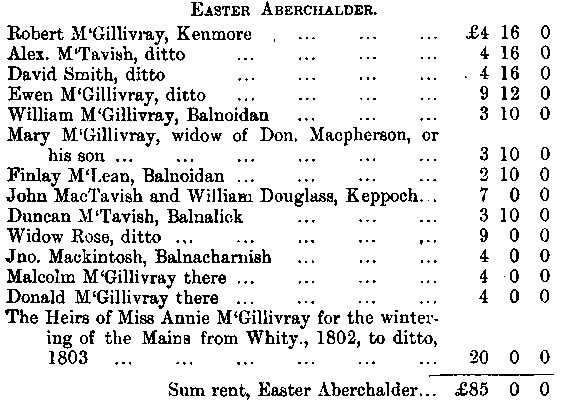
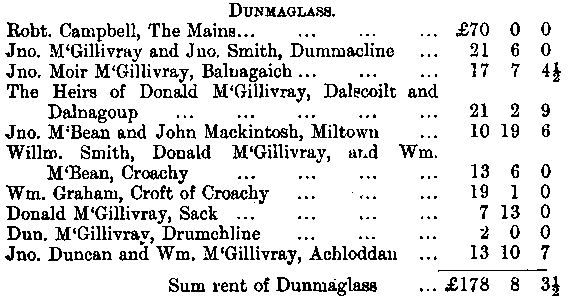

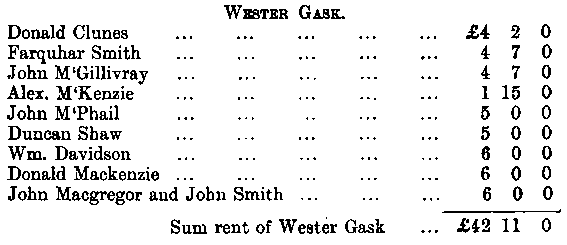
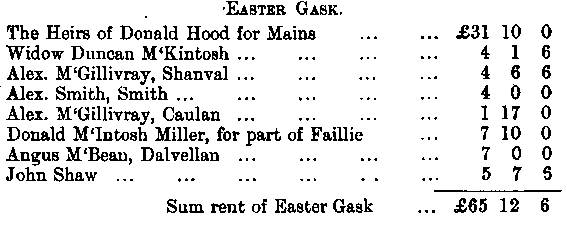
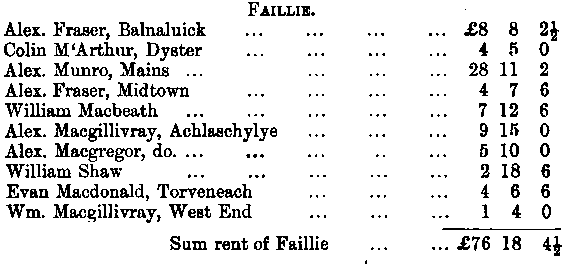
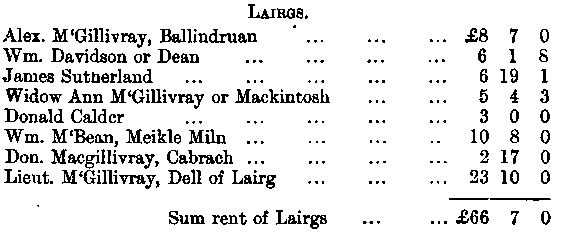
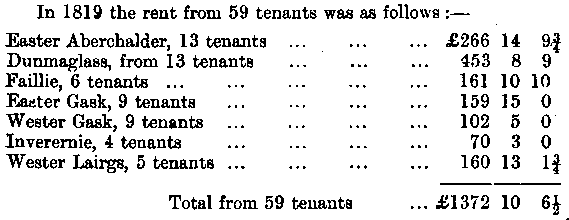
and it will be kept in
view that shooting rents had not begun. John Lachlan was very wild in
his youth, and Sheriff Fraser, Farraline, one of the guardians, had*
some difficulty in compounding for his pranks at the College of St
Andrews in 1797. lie purchased a cornetcy in the 16th Li^ht Dragoons in
1800 for £735, and a lieutenancy in same regiment in 1802 for £262 10s,
And was very extravagant. Fortunately he left the army about 1805, when
he married Miss Jane Walcott of Inverness, a lady who had much influence
with him for good, though some of his exploits with old Culloden and
other “Braves” of the day are still remembered. They lived at Culduthel,
Drummond, travelled Abroad a good deal, but had no regular residence
except Inverness. After his wife’s death Dunmaglass led a somewhat
retired life, and many will recollect his fine military carriage, and
how well he sat on horseback as he took his daily rides in Inverness.
During his long
possession of the estates it says much lor him /mat he only had three
factors all the time—1st, Mr Campbell Mackintosh; 2nd, Mr Robert Lagan;
and 3rd, Mr Alex. Grant. His father-in-law, Captain Thomas Walcott, thus
refers to him in his holograph will of 1807 :—“ Item to John
Macgillivray, my own desk that I write at, with the old stock buckle
that he gave tne. Had I anything worth his acceptance I should out of
gratitude have left it to him.” His rental at his death was only £1496
4s, which included £180 for shootings. This was less than in 1819, but
the tenants had reduced from 71 in 1803 to 59, and in 1852 numbered less
than half, or 35.
He died in 1852,
possessed of some £40,000 of money, which was destined by will,
including a year’s rent to all the tenants ; also the heritable estates
undisposed of, but free and unburdened. A severe competition arose as to
all the estates except one, that of Easter Aberchalder, there being no
doubt that it fell to the Hon. John Macgillivray, of Upper Canada, heir
male of line of Donald, Tutor of Dunmaglass, and eldest surviving son of
Farquhar Macgillivray of Dalcrombie. Dunmaglass, Easter Gask, and Wester
Lairgs. were destined to heirs male, and the contest was betwixt the
said John Macgillivray, who dying, his son Neil John, descendant of
Donald ihe Tutor, on the one part, and the Rev. Lachlan Macgillivray,
descendant of William of Lairg, brother of Donald the Tutor, on the
other part, the question being whether Donald or William was the elder,
determined in favour of Neil John, Faillie, Wester Gask and Inveremie
were destined to “ the heirs and assignees of Clan Chattan,” and
competed for by the said Neil on the one part, and the descendants of
Jean “ Roy,” sister of Lachlan " Lia,” and daughter of Captain William
Ban Macgillivray, all before mentioned, on the other part, the latter
contending that,, being the nearest heirs of John Lachlan, the
limitation to being of Clan Chattan was inoperative. Judgment was given
for them, and shortly after these estates were sold.
XI. The Honourable John
succeeded as heir male to John Lachlan in 1852, and died in 1855.
XII. Neil John, who
succeeded his father in Aberchalder, and made good his claims to
Dunmaglass, Easter Gask, and Wester Lairgs. He sold the last two
estates, and was succeeded iu. Dunmaglass and Easter Aberchalder by his
son.
XIII. John W.
Macgillivray, the present Dunmaglass, in whose time, alas, the remaining
estates had to be compulsorily sold, and the whole of the onct>
important estates of the Magillivrays are lost to the Clan Chattan,
except Wester Lairgs, which is the property of The Mackintosh. Though
the Macgillivrays are now dissociated from all landed connection with
Strathnairn, their memory ought.. not and is not likely to fade, for
Iain Doun Mac Sheumais-vic-Dhaibhidh truly said of the name and race—
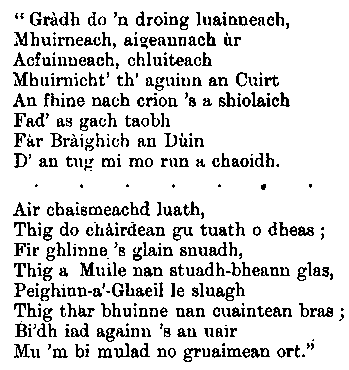
|

